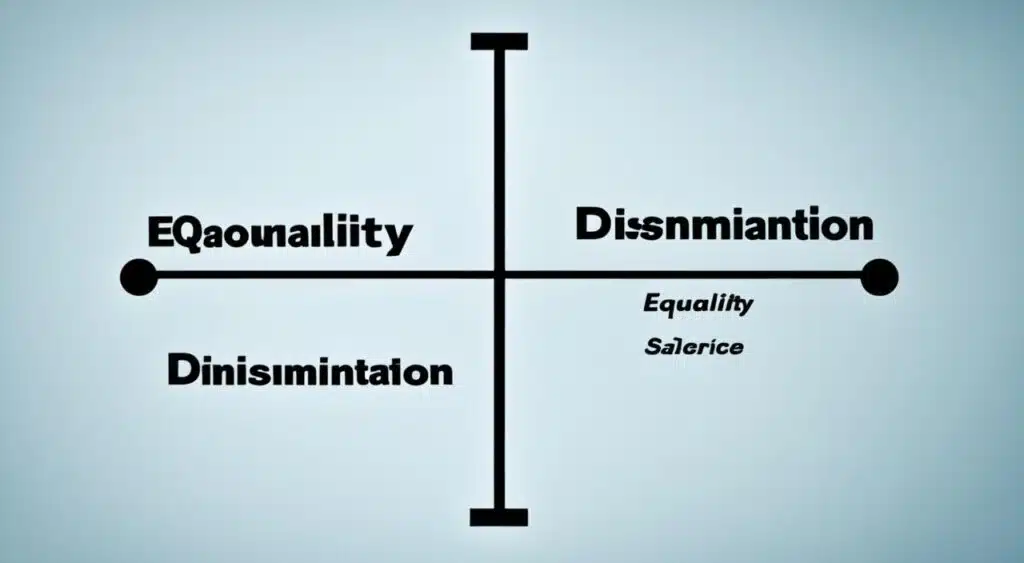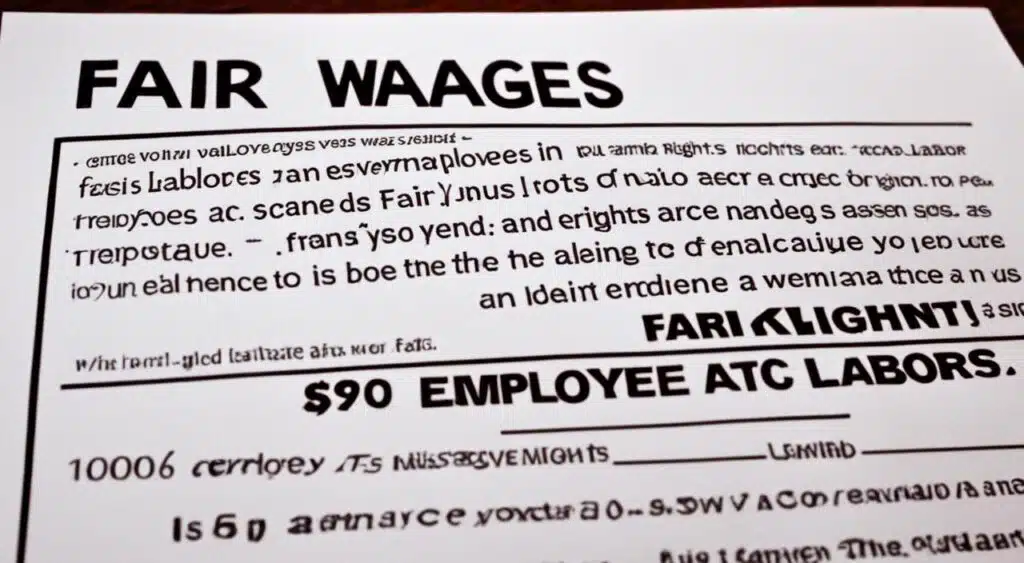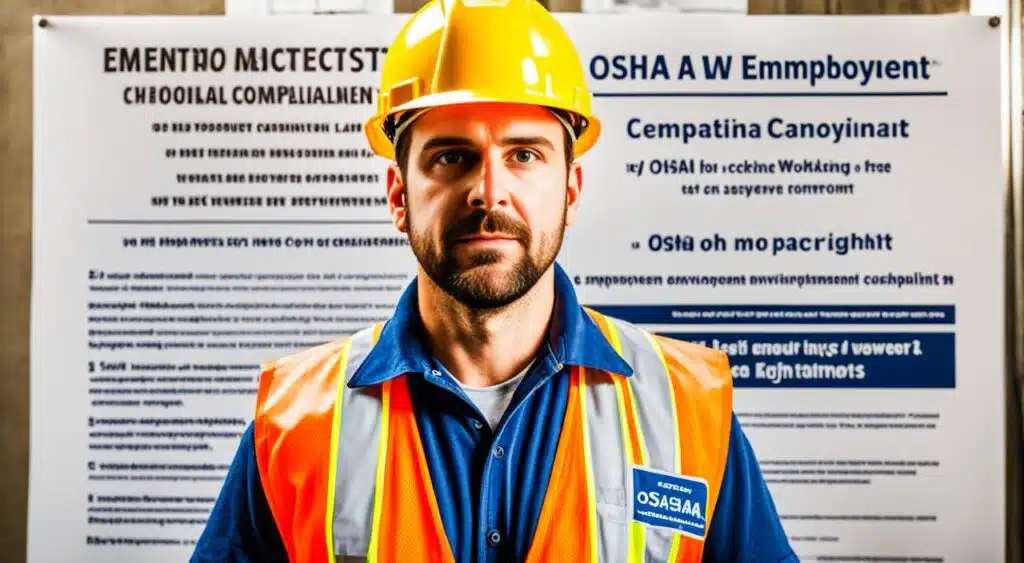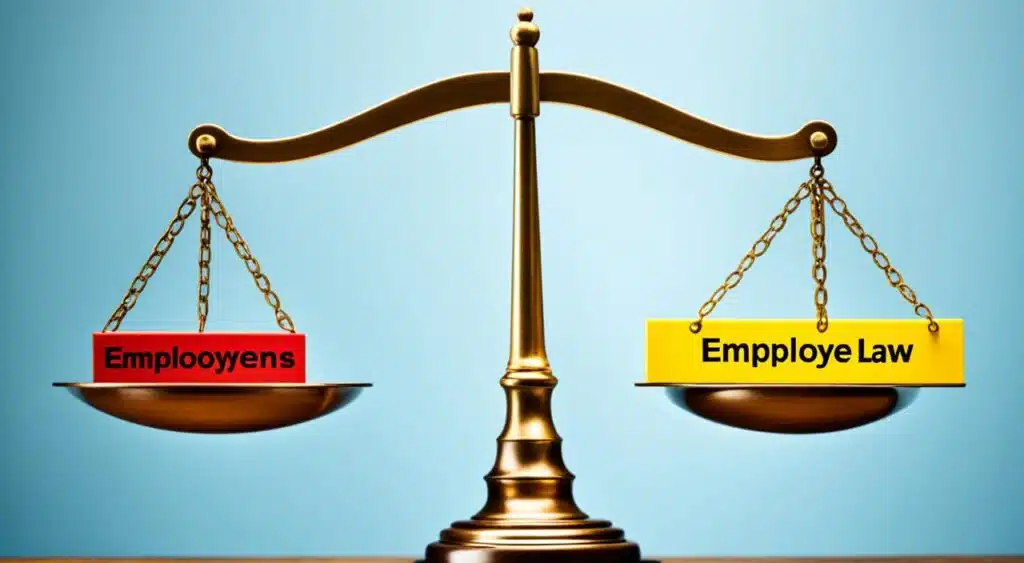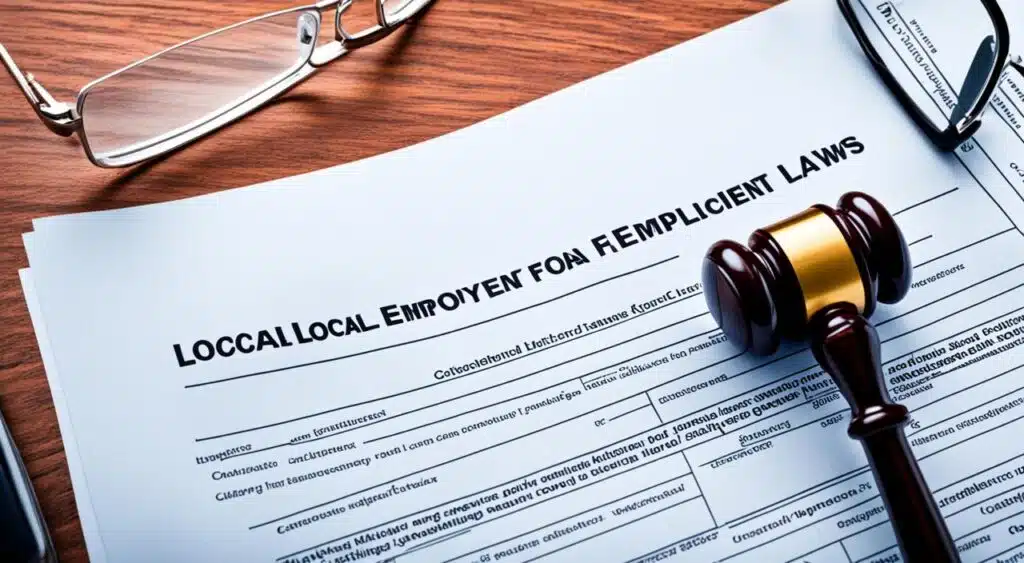In the United States, employees have many rights under federal, state, and local laws. These laws protect workers from unfair treatment, ensure fair pay, and keep them safe at work. It’s important to know your rights to stand up for yourself at work.
Employment law covers a lot, like stopping discrimination based on things like race, religion, or age. It also makes sure workers get fair pay and overtime. Plus, it protects those who speak up about wrongdoings and gives them workers’ compensation.
Employees can take unpaid leave for health or family reasons thanks to the Family and Medical Leave Act (FMLA). They also have the right to work in a safe place, as the Occupational Safety and Health Act (OSHA) says.
Also Read : What Is The Purpose Of Tax Law?
Key Takeaways
- Employees have legal protections against discrimination, harassment, and unfair labor practices.
- Federal laws such as the Fair Labor Standards Act (FLSA) and FMLA provide for minimum wage, overtime pay, and leave benefits.
- OSHA regulations ensure a safe and healthy work environment for employees.
- The at-will employment doctrine allows employers to terminate employees without cause, with some exceptions.
- Unions and concerted activity are protected under the National Labor Relations Act (NLRA).
Introduction to Employee Rights
Employment law is a complex set of federal, state, and local rules. These rules protect workers’ rights in areas like anti-discrimination, fair pay, safety, and leave. It’s important for employers and employees to know these rights to keep the workplace fair and productive.
Overview of Employment Law
Employment law covers many laws to make the workplace fair and just. It includes federal laws like the Civil Rights Act and the Fair Labor Standards Act, as well as state laws. Knowing about these laws is key for employers to meet their duties and for employees to protect their rights.
Importance of Understanding Employee Rights
- Ensures compliance with relevant laws and regulations
- Promotes a fair and equitable work environment
- Empowers employees to advocate for their rights
- Helps employers avoid costly legal disputes and penalties
- Fosters a productive and engaged workforce
Learning about employment law helps employers and employees work together. This creates a workplace that is legal, supportive of growth, and fulfilling for everyone.
Also Read : What Are Key Principles Of Corporate Law?
Anti-Discrimination Laws
In the United States, there are strong laws to protect workers from unfair treatment. The Civil Rights Act of 1964 and other laws stop employers from treating people unfairly because of their race, color, religion, sex, national origin, disability, age, or genetic information.
Equal Employment Opportunity Commission (EEOC)
The Equal Employment Opportunity Commission (EEOC) is in charge of these laws. They look into claims of unfair treatment at work. They make sure employers are fair when hiring, promoting, and letting people go.
Protected Classes under Federal Law
Some groups are protected by law, keeping them safe from unfair treatment:
- Race
- Color
- Religion
- Sex
- National origin
- Disability
- Age (40 and older)
- Genetic information
Employers must check their rules and actions to make sure they don’t unfairly treat people in these groups. Following these laws is not just a must-do. It’s also key to creating a workplace that values diversity, fairness, and inclusion.
Also Read : What Is The Purpose Of International Law?
Fair Labor Standards Act (FLSA)
The Fair Labor Standards Act (FLSA) is a key federal law in the United States. It was created in 1938. It sets rules for minimum wage, overtime, and child labor for many workers in the private sector and government.
Minimum Wage and Overtime Pay
Under the FLSA, workers must earn at least $7.25 an hour. Employers must also pay overtime. This is one and a half times the regular hourly wage for work over 40 hours a week.
This rule helps ensure workers get fair pay. It supports a good balance between work and personal life.
| Provision | Requirement |
|---|---|
| Minimum Wage | $7.25 per hour (federal minimum) |
| Overtime Pay | Time and a half the regular rate of pay for hours worked over 40 in a workweek |
The fair labor standards act is vital for protecting workers in the private sector and state and local government. It guarantees a basic wage and overtime pay. This ensures fair wage and hour laws for everyone.
Also Read : How Are Administrative Law Decisions Made?
Family and Medical Leave Act (FMLA)
The Family and Medical Leave Act (FMLA) is a key federal law. It gives eligible employees the right to take unpaid leave for family and medical reasons. This law helps workers balance work and personal life. It ensures they can take care of family and health issues without losing their jobs.
Under the FMLA, eligible employees can take leave for these reasons:
- The birth or adoption of a child
- The employee’s own serious health condition
- Caring for a family member with a serious health condition
To get FMLA leave, an employee must work for their employer for at least 12 months. They must also work at least 1,250 hours during that time. The employer must be a “covered employer.” This includes private companies with 50 or more workers, public agencies, and schools, no matter the number of employees.
The FMLA is a safety net for workers. It lets them take time off for family and medical reasons without losing their jobs. This job-protected leave helps employees take care of their health and family. It also helps employers keep skilled workers and maintain a healthy team.
“The Family and Medical Leave Act is a vital piece of legislation that has helped millions of Americans balance their work and family responsibilities.”
Occupational Safety and Health Act (OSHA)
The Occupational Safety and Health Act (OSHA) is key in making workplaces safe. It protects workers’ rights. Employers must give their workers a safe place to work. They must follow rules to prevent injuries, illnesses, and deaths at work.
Workplace Safety Standards
OSHA has many safety standards for employers to follow. These cover things like sharing safety info, using protective gear, and keeping electrical and machines safe. Employers must check for risks and keep the workplace safe.
Whistleblower Protection
The Occupational Safety and Health Act also protects whistleblowers. It stops employers from punishing workers who report dangers or break rules. If workers face bad treatment for speaking up, they can complain to OSHA. OSHA will look into it and help the whistleblower.
OSHA is important for workers to keep their jobs safe and healthy. Knowing their rights under OSHA helps workers make their workplaces safer. It makes sure employers take care of their workers.
| OSHA Requirement | Description |
|---|---|
| Workplace Safety Standards | OSHA sets rules to prevent injuries, illnesses, and deaths at work. These rules cover safety topics like sharing safety info, using protective gear, and keeping electrical and machines safe. |
| Whistleblower Protection | The OSHA whistleblower program stops employers from punishing workers who report dangers or break rules. Workers can complain to OSHA if they face bad treatment. |
“The Occupational Safety and Health Act is a critical piece of legislation that empowers employees to actively participate in maintaining a safe and healthy workplace.”
Also Read : These 50 Photos Of Unique People Show That Genetics Is Hard To Forget
Employment Law
Employment law covers the rights and duties of employers and employees. It includes the at-will employment doctrine and the impact of employment contracts on ending jobs.
At-Will Employment Doctrine
In the U.S., employers can usually fire employees for any reason at any time. This is known as the at-will employment doctrine. They don’t need a special reason, and employees might not get notice.
Employment Contracts and Termination
But, employment contracts and laws can protect against unfair firing in some cases. Some contracts might list valid reasons for firing or require notice before ending a job. Laws also stop employers from firing people for unfair reasons like discrimination or revenge.
It’s important for employers and employees to know about employment law. This includes the at-will doctrine and how contracts affect job endings. It helps them protect their rights at work.
| Key Concept | Description |
|---|---|
| At-Will Employment | Employers can generally terminate an employee’s employment at any time, for any reason, as long as the reason is not illegal. |
| Employment Contracts | Contracts may provide additional protections against wrongful termination, such as specifying reasons for termination or requiring notice periods. |
| Wrongful Termination | Termination for reasons that constitute discrimination or retaliation may be unlawful, even under the at-will employment doctrine. |
“Understanding the nuances of employment law is crucial for both employers and employees to protect their rights in the workplace.”
Union Rights and Concerted Activity
The National Labor Relations Act (NLRA) protects the rights of employees to join together for better wages and working conditions. It lets employees form, join, or help a union and do “concerted activity” for their benefit.
The National Labor Relations Act (NLRA)
The NLRA is enforced by the National Labor Relations Board (NLRB). It investigates unfair labor practices. This law protects employees’ right to organize and bargain with their employers. It ensures workers can use their union rights and take part in concerted activity safely.
- The NLRA lets employees form, join, or help a union and bargain with their employer.
- They can also do other concerted activity for their benefit, like talking about wages and working conditions with coworkers.
- The NLRB looks into and deals with unfair labor practices. This includes stopping, restraining, or coercing employees from using their NLRA rights.
Knowing about the National Labor Relations Act helps employees use their union rights and take part in concerted activity. This way, they can make their workplaces better and stand up for their interests.
“The right of workers to organize and bargain collectively is fundamental to the American system of labor relations.”
State and Local Employment Laws
Many states and local areas have their own employment laws and regulations. These laws can be different from federal ones. It’s important for employers and employees to know the laws where they work.
Variations in State and Local Regulations
The variations in state and local regulations can be big. Some states have stricter employment laws than the federal law. Others offer fewer protections. It’s key for employers and employees to keep up with the local employment laws and state regulations in their area.
- Some states have expanded anti-discrimination laws to include more protected classes than federal law.
- Certain states have set higher minimum wage requirements than the federal standard.
- Many states have their own family and medical leave policies. These may offer more benefits or cover more people than the federal FMLA.
- Some local areas have workplace safety standards that are stricter than federal OSHA rules.
Employers and employees need to keep up with the local employment laws and state regulations in their area. This helps them follow the rules and understand their rights and duties.
“Navigating the patchwork of state and local employment laws can be a complex challenge, but understanding these variations is crucial for both employers and employees to ensure compliance and protect their rights.”
Also Read: Guide To Legal Education
Conclusion
Employment law in the United States is complex and covers many areas. It includes federal, state, and local laws that set clear rights and duties for employers and employees. Knowing these laws helps businesses create a positive work environment. This environment supports productivity, job satisfaction, and follows the law.
Employment laws protect workers and ensure fair treatment at work. They cover things like anti-discrimination and workplace safety. Employers who know their legal duties can avoid legal problems and keep good relations with their workers.
It’s key to protect employee rights and meet employer duties for a healthy work culture. By keeping up with employment law changes, businesses show they care about doing things right. This helps their reputation and supports the well-being of their workers.
FAQs
Q: What are employee rights under employment law?
A: Employee rights under employment law include protection against discrimination, harassment, and retaliation in the workplace. Additionally, employees have rights related to wage laws, termination of employment, and other employment-related issues.
Q: How does employment law attorney help employees?
A: An employment law attorney helps employees by providing legal advice, representing them in employment disputes, and ensuring their rights are protected under federal and state employment laws.
Q: What is the role of an employer in relation to labor laws?
A: Employers are required to comply with labor laws that regulate various aspects of the employment relationship, such as wage laws, occupational safety and health standards, and anti-discrimination laws.
Q: What are common issues addressed by employment law attorneys?
A: Employment law attorneys commonly handle issues related to discrimination, wrongful discharge, wage disputes, and violations of employment laws that protect employees.
Q: How do employment laws protect employees in the workplace?
A: Employment laws provide protections for employees by ensuring fair treatment, safe working conditions, and legal recourse in cases of discrimination, harassment, or other violations of their rights.
Q: Can an employee take legal action in employment law violations?
A: Yes, employees have the right to take legal action against employers in the event of employment law violations, such as discrimination, retaliation, or wrongful termination.
Q: What federal agencies oversee enforcement of employment laws?
A: The Department of Labor and the Occupational Safety and Health Administration (OSHA) are federal agencies responsible for enforcing labor laws and ensuring employer compliance with federal and state regulations.

